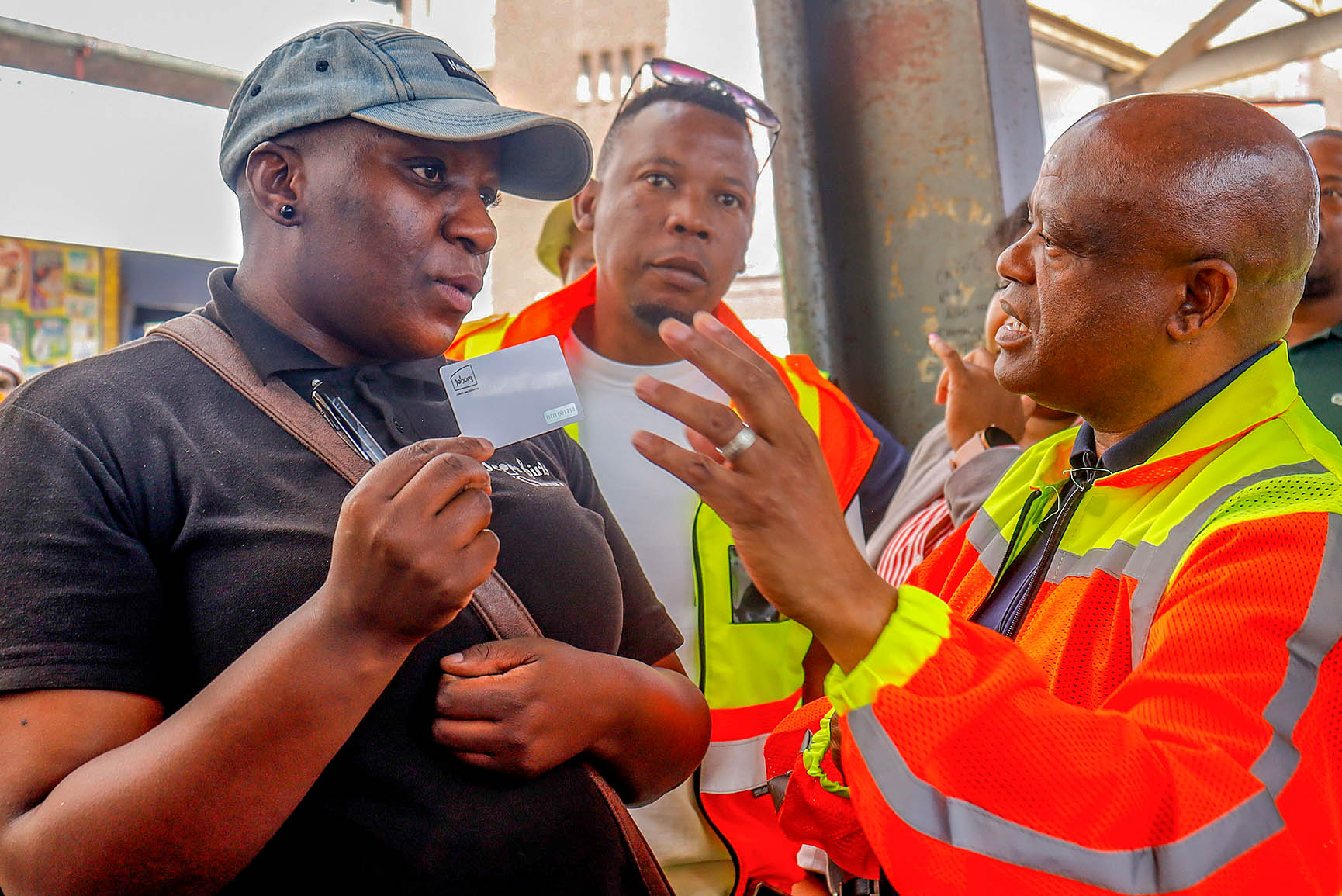Johannesburg Mayor Dada Morero has defended the eviction of informal traders in the inner city, saying the move is about regularising informal trade and restoring order.
In April 2022, the city approved an informal trading policy, a blueprint for regulating street trade to enhance order, safety and economic growth. The policy introduced a digital permit system and promised a transparent allocation of trading stalls.
The policy was not implemented, however, until early October 2025, when the Johannesburg Metropolitan Police Department (JMPD) evicted informal traders on De Villiers Street and other parts of the inner city and ordered them to apply for permits.
On Friday, 31 October, the Gauteng Division of the High Court in Johannesburg will hear an application by the informal traders, represented by the Soci-Economic Rights Institute (Seri), to declare the evictions illegal.
Read more: Informal traders challenge City of Joburg’s inner-city evictions in court
Morero and the MMC for economic development, Nomoya Mnisi, have blamed Seri for the city’s failure to implement its informal trading policy.
“We are only implementing now because we have had those ‘slowdown litigations’ from Seri,” said Mnisi.
“When we announced last year that we intended to launch the permit system, we were met with those frivolous court actions, not once but every time we said we are launching.”
/file/dailymaverick/wp-content/uploads/2025/10/IMG_20251024_112634.jpg)
However, Seri’s Deborah Raduba said, “We didn’t litigate last year. We only sent letters.”
Last Friday, the city issued 40 smart card trading permits to eligible informal traders. According to the city, informal traders must have a permit to trade legally in designated zones.
Informal traders told Daily Maverick that their permits, which expired in 2016, had not been renewed since 2012.
“Since then, the city has not been issuing smart cards because they had to address the policy issue,” one of the leaders of the South African Informal Traders Forum (SAITF), Brian Phaaloh, told a gathering of informal traders in Johannesburg on Monday.
“These removals are permanent; therefore, we need to be united,” he added.
Read more: Informal traders evicted from Joburg thrift haven as city embarks on crackdown
Another SAITF leader, Livingstone Mantanga, said, “Let’s hold on and let’s pray that the court upholds the rules of the country. The ANC thinks they can claw back power by removing foreign nationals from the streets. They are coming with a xenophobic strategy.”
Urgent court action
In court papers, informal traders contend that their removal by members of the JMPD and city officials was unlawful.
“This is an application to restore the applicants to their lawfully held trading locations within the inner city of Johannesburg, where the applicants were trading until they were unlawfully disrupted and removed from trading on 02 October 2025,” the court papers state.
“Since then, we have been unable to trade and have, as a result, suffered severe financial constraints as the informal trading is our only way of generating income to feed our families.”
The traders said that some of their goods were confiscated during the evictions.
They argue that the actions of the city and its entities, such as the recently disbanded crime prevention wardens, the JMPD and city officials, violated their right to dignity and freedom of trade.
/file/dailymaverick/wp-content/uploads/2025/10/IMG_20251008_105255.jpg)
In 2014, in another matter between informal traders and the city, the Constitutional Court delivered a scathing judgment against the city, calling an operation to remove informal traders an act of “humiliation and degradation” and emphasising the right to earn a living.
Apart from granting the interdict preventing the city from interfering with the applicants ‘trading, the city was also slapped with the costs of the court action, including those of two counsel. The Constitutional Court also ruled that “verification” of permits was not a sufficient reason to evict traders.
On 19 July 2022, members of the JMPD prevented informal traders in Rissik and De Villiers streets from trading.
On 25 July 2025, following another application to restore their trading rights, the city made a settlement offer in terms of which the traders could return to their trading spaces. The city’s offer was made an order of the court.
“As it stands, we cannot trade because we fear that we will be violently confronted,” said the applicants in the current case.
They acknowledged the importance of adhering to bylaws and trading policies, but said the evictions were arbitrary.
“We were simply to be treated as ‘dirt’ to be ‘swept away’ from the streets,” they contend.
Impact on livelihoods
The deputy chair of the SAITF, and first applicant, Ayanda Kela, who has been trading since 2002, said the income which he made, R450 to R500 a week, supported his four minor children.
“Since trading has been interrupted, I will not be able to provide for my children. I cannot even afford to provide them lunch money,” he stated.
“If the prohibition on trade continues, my children and I will end up homeless.”
Informal trader Mericca Kheswa (48) has been selling food since 1996, earning nearly R3,000 a month.
“My three children who stay with my mother back home in Mpumalanga are entirely dependent on me,” said Kheswa. “Being unable to work will make them suffer, and they will starve and will not be able to go to school.”
Thabani Tshuma (52) sold belts, bags and socks near the Noord Taxi Rank for two decades, earning between R1,000 and R3,000 a month.
“I have no money to pay rent as of the current month, and my four schoolgoing children will suffer,” said Tshuma. “The children and myself will have nothing to eat, and they will be affected in school.”
Who is qualified to trade?
According to the City of Johannesburg, to qualify, traders must be South African citizens currently operating within the city. Applications are processed at the City’s Informal Trading Office at 66 Jorissen Place, Braamfontein, where traders must submit a certified ID copy, proof of residence, and trading location details.
Once verified, traders' details are entered into the city’s Informal Trading Permits System and they are issued a smart trading card.
Read more: After the Bell: Joburg and informal traders — the never-ending story
Support for the evictions
There has been some support for the eviction of the informal traders, often linked to a perception that many are undocumented migrants, and that their trading contributes to litter and crime in the city.
Charmain Lottering (34) told Daily Maverick, “The streets are clean now. I can finally visit my favourite places in downtown.
“I was scared to go even to safer places such as Maboneng because to get there you had to go through the criminals and filth caused by the informal traders.”
/file/dailymaverick/wp-content/uploads/2025/10/557629792_1373416354789786_7725753625673764757_n.jpg)
David Nxumalo (66) said, “I want to thank the current mayor of the city of Johannesburg for reclaiming our city. The mayor and his people must now ensure that they maintain the clean standards beyond the elections.”
Kelly Modibedi (28) supported the evictions, but was sceptical about the motivations and long-term impact.
“Let’s speak again after the elections,” she said. “I can tell you now that this is not done for the benefit of South Africans. If it was being done for South Africans, why did it take them so long to clean?
“All this work is being done for two main reasons: to impress the G20 visitors to the country next month and to try and sweep the yard ahead of the approaching local government elections.” DM





 Mayor Dada Morero hands over an informal trading permit at Noord Street Market, Johannesburg, on 24 October. (Photo: Sharon Seretlo / Gallo Images)
Mayor Dada Morero hands over an informal trading permit at Noord Street Market, Johannesburg, on 24 October. (Photo: Sharon Seretlo / Gallo Images)